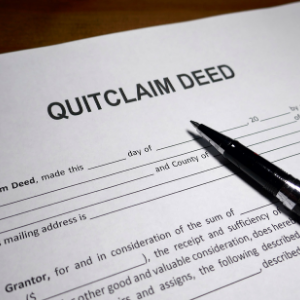
Removing a name from a deed in Baltimore, MD, can be a critical step in property management, whether due to changes in ownership, legal obligations, or personal circumstances. Understanding the process ensures a smooth transition while adhering to local regulations. This step-by-step deed removal guide will walk you through the necessary procedures, providing clarity and guidance on documentation, legal considerations, and filing requirements specific to Baltimore. Whether you’re navigating the process independently or with legal assistance, this guide offers valuable insights to effectively streamline your deed adjustment journey.
Key Highlights
- Understand the roles of quitclaim and warranty deeds in Maryland property transfers for effective legal compliance.
- A quitclaim deed facilitates quick ownership transfers without warranties, which is ideal for family arrangements but carries potential risks.
- Warranty deeds guarantee clear property titles and legal protection against liens, which are crucial for formal transactions.
- Legal removal of a name requires accurate documentation, understanding Baltimore’s filing needs, and adherence to local laws.
- Consulting with legal professionals and Maryland court resources ensures smooth property transitions and compliance.
Understanding Deed Types in Maryland
Understanding the various deed types is essential when dealing with property transactions in Maryland. Different deeds play unique roles in transferring real property, each with its own implications. Choosing the right deed can significantly affect property rights, from quitclaim deeds that allow swift ownership transfers to warranty deeds that provide comprehensive legal protection. For those navigating Maryland’s land records, comprehending these deeds is crucial to ensure smooth transitions and legal compliance.
What is a Quitclaim Deed?

A quitclaim deed, often utilized in Maryland for property transfers, is a legal document allowing owners to transfer any ownership interest they possess in real property without warranties or guarantees. This type of deed does not certify that the grantor owns any interest, but simply transfers whatever interest they might have. This feature makes it a popular choice for quick, uncomplicated transfers among family members or to correct names on property records. Quitclaim deeds are beneficial for transferring property between friends or family, as these situations often don’t require the legal guarantees of ownership that a warranty deed would provide.
In Maryland land transactions, a quitclaim deed can expedite the deed transfer process by sidestepping some of the complications associated with real property transfers. However, it’s crucial to note that quitclaim deeds do not protect the grantee from any claims or liens against the property that may have existed before the transfer. Therefore, while they effectively change records quickly and legally, parties should be aware of the potential risks.
Moreover, when filing a quitclaim deed in Baltimore or elsewhere in Maryland, the correct handling of related documentation is essential to ensure the validity of the transfer. Potential grantors and grantees should know the necessary recordation tax and other fees associated with recording the deed with local land records offices. Consulting with an attorney is advisable to navigate these legal complexities efficiently and to safeguard one’s property rights fully.
Knowing these differences is key for homeowners in Baltimore and surrounding cities like Towson, Dundalk, and Glen Burnie. And if paperwork and legal steps feel daunting, companies such as CR of Maryland I LLC can help you explore alternatives—like selling your house fast for cash in Baltimore or even in Ellicott City, Columbia, or Catonsville—without the stress of complicated deed transfers.
Role of Warranty Deeds in Maryland
Warranty deeds are pivotal in Maryland’s real estate transactions by offering greater legal protection and assurances than quitclaim deeds. A warranty deed guarantees that the grantor holds a clear title to a property, free of encumbrances such as liens or other claims, and has the legal authority to transfer it. This assurance makes warranty deeds preferable in more formal property transactions where a comprehensive verification of ownership and freedom from encumbrances is desired.
In Maryland, warranty deeds are used frequently when significant purchases or sales of real property are involved, especially when new owners want to secure full legal ownership rights. This type of deed provides not only the transfer of ownership but also the grantor’s warranty that the title is valid, thus offering the grantee legal recourse should any claims against the property arise post-transfer.
The comprehensive assurances provided by warranty deeds necessitate thoroughly examining the property’s land records before the transaction to confirm the absence of existing liens or issues. This due diligence ensures the warranty deed fulfills its intended legal protection role. Such preparations typically involve title searches, which verify that the property is free of debt obligations, and often require an attorney’s expertise to interpret complex land records.
Additionally, when executing a warranty deed, parties must be prepared to adhere to the legal processes set forth by Maryland law, including payment of applicable recordation taxes and other fees required for the deed’s official recording. Understanding the full scope and responsibilities associated with warranty deeds is crucial for property buyers and sellers aiming to ensure their transactions are legally sound and risk-minimized.
Steps to Legally Remove a Name from a Deed
Removing a name from a property deed in Baltimore, MD, involves several key legal steps to ensure the process is handled correctly and complies with Maryland state laws. These actions include preparing and gathering the necessary documentation, understanding specific filing requirements within Baltimore, and navigating the local legal system. Each step should be carefully executed to safeguard property rights and avoid potential disputes. Consulting with a legal professional, particularly when dealing with a quitclaim deed or warranty deed, can provide valuable guidance through this complex process.
Preparing the Necessary Documentation
Successfully removing a name from a property deed begins with the assembly of the appropriate legal instruments. Choosing the correct deed form is paramount. A quitclaim deed, for example, is often suited for straightforward transfers among relatives or in parcels where a bare conveyance is desired. Such an instrument conveys only the interest, if any, the grantor possesses, minus any covenants of warranty. Prior verification of the subject title is thus indispensable. Equally important is securing written, informed consent from all grantors and grantees regarding the deed’s effect, accompanied by an acknowledgment of the potential relinquishment of any equities.
Along with the deed, the orator must procure all ancillary documentation substantiating the conveyance. This often comprises the latest recorded deed, matching identification for all signatories, and, where applicable, preparatory instruments such as releases from spousal interests or custodial affidavits. Given the probate and title dependability built upon exactitude, transcriptions must reflect the originals without distortion. Practitioners of fundamental property law customarily advise conferring with legal counsel to compose, hence review, the proposed deed record, thereby furnishing predictive margins against future title contests. An attorney can contextualize easements, mineral reservations, or hypothetical hardships that may render a lateral title survey or boundary line rewrite unserviceable.
In addition to the stated obligations, each transfer must contemplate the expense of the recordation tax, triggered by the deed recording within Baltimore, Maryland. Such taxation is not ancillary; instead, it legitimizes the legal exchange and safeguards against penalties or provides an incomplete transaction record. Advance comprehension and budgeting of these financial elements can shorten the duration of deed expungement. Careful assembly of all requisite instruments before submission to the recorder’s office minimizes risks of procedural interruption and thus preserves the integrity and expedience of the conveyance of title.
Filing Requirements in Baltimore, MD
To initiate the removal of a name from a Baltimore deed, the applicant must adhere to a fixed set of procedural, statutory, and documentary prerequisites, thereby assuring the valid transmission and record of the genuine property interest. The deed is ordinarily presented to the Baltimore City Circuit Court, Land Records Division, although the Baltimore County Land Records Office continues to perform analogous functions.
Applicants commence the transaction by filing a fully executed and accurate deed—in the case of a name removal, a quitclaim form is most common—accompanied by all incident papers, such as tax certification and a property description cover sheet. Each submission must comply with the Maryland Real Property Article and applicable Baltimore administrative codes to eliminate the risk of denial or substantial delay.
Filing fees, essential to administrative processing, must be remitted at the time of submission. These fees fluctuate according to the procedural complexity of the incident matter—primary factors include the type of deed, the number of parcels, and the requisite indexing—and whether a certification of no lien or other ancillary document is required.
Verify the precise fee schedule published in the circuit or county guidelines to avoid unexpected outlays. Most practitioners recommend retaining a Maryland-licensed real estate attorney with recent and demonstrable experience in Baltimore law, as the attorney will ensure compliance with numerous statutory drafting, notarization, and recordation particulars.
A fundamental consideration when petitioning relief in Baltimore is the recordation tax obligation. This charge becomes due at the point of recording a deed, with the rate determined by the estimated value set by the local assessor. Proper computation of the amount is imperative; otherwise, the deed’s acceptance is at risk.
An erroneous computation, an overlooked exemption, or an inappropriate reporting practice could convert a routine filing into an extended dispute, jeopardizing the intended effectiveness of removing a grantor’s name. Further, strict observance of Baltimore’s administrative and procedural guidelines is indispensable to ensure prompt and valid deed processing.
After filing, the document and all pertinent exhibits are entered into the official property records, thereby issuing an authoritative and publicly accessible account of the transfer. This procedural transparency is a fundamental safeguard against later ownership contests, as the recorded deed marks the effective distribution of title.
Property Ownership Changes After Divorce
Divorce can significantly alter property ownership, especially when handling real property in Maryland. Divining property rights between spouses often necessitates legal actions to remove a name from the deed, impacting how ownership is recorded. Understanding the process and implications involved in executing such changes, particularly through mechanisms like a quitclaim deed, is crucial. Legal nuances are pivotal in this transformation, and awareness can prevent future disputes. Navigating this landscape requires strategic planning and legal expertise, from property rights to legal procedures.
How Divorce Affects Property Rights

Divorce entails significant alterations of property entitlements, particularly regarding real estate. In Maryland, property obtained after the marriage is generally considered to vest in both spouses, absent a contrary directive in a premarital agreement. When the marriage dissolves, this communal entitlement usually compels the severance of one spouse’s name on the title so that post-marital ownership may be clearly documented.
A quitclaim deed serves as the customary instrument, enabling one party to convey any interest in the property to the other without recitation of covenants of title. While this deed expedites the conveyance, meticulous drafting and precise recording with the Maryland land records are imperative to prevent future disputes and to fulfill evidentiary and statutary requirements.
Adjusting ownership of real property following a divorce involves more than simply signing over an existing title; it requires a thorough analysis of each spouse’s title interest and the substantial tax ramifications that may arise after. When an individual assumes exclusive ownership, their taxable estate may expand, and the total aggregate tax liability may be stratified, exposing them to the risk of paying previously deferred real estate taxes or jointly incurred liens. Because such transfers are involuntary gifts between spouses, their treatment under the Internal Revenue Code may introduce unintended fiscal exposure.
Consequently, revisions to personal and retirement cash-flow projections are neither extraneous nor negligible; they are catalytic, warranting concurrent counsel from practitioners versed in community-agriculture law and the algebra of post-divorce budgeting. More critically, the parties must determine the longer-term fate of the marital residence. Retaining the property typically mandates executing a quitclaim deed to remove the former spouse’s interest; conversely, a sale consummates the marriage interest, and an entirely fresh deed is executed to reallocate the encumbrances to the showroom estate.
Failure to appropriately memorialize either event may trigger post-divorce litigation, resulting in exposure to extrinsic liens, disseminated collateral valuations, and pronunciated administrative encumbrances. To preemptively insulate one’s net estate, counsel must oversee the precise strat-users in addition to asset-conleader construction; such rigorous supervision is necessitated at the stage of pre-document tax analyses, compelling valuations, and table-ready execution.
If you find yourself in this position, CR of Maryland I LLC can help. They buy houses for cash in Catonsville, Glen Burnie, and Columbia, making it easier for homeowners to get a clean break and move on without worrying about court filings or property disputes.
Legal Implications of Removing a Name
Excluding an individual’s name from a property deed entails significant legal ramifications and demands systematic precision throughout the procedure to preempt future disputes. Maryland property law meticulously prescribes the steps involved, and compliance with both state statute and county ordinances is mandatory.
The technique typically employed is the execution and recording of a quitclaim deed, which constitutes an unequivocal renunciation of present and future interests by the grantor. This act realigns the title and allocates corresponding rights and liabilities to the grantee. For the revised ownership to take legal effect, the deed must be filed with the local land records office, where it becomes an official entry of the newly established title and precludes subsequent questioning.
Failure to satisfy statutory formalities may produce untreated defects in the property chain of title, leaving the transaction open to judicial correction. Such defects may emerge from imprecise legal descriptions, inadequately acknowledged signatures, or omissions of requisite witnesses and notarial endorsements. Any of these flaws can produce a deed deemed inoperative, thus perpetuating the pre-existing title and eroding the assumption of the grantee.
An unsuspecting purchaser or lender guided solely by the public record may later contest the extent of the removed interest, generating expensive and protracted litigation. Concurrently, the withdrawal of an owner from the title can trigger taxation contingencies. Maryland law provides that the reassessment of the property’s value may be warranted based on the ownership alteration. Therefore, the continuing owner is advised to consult the appropriate assessment division to ascertain any differential tax obligations that may attach, thus fortifying the transaction against adverse fiscal consequences.
The counsel of a qualified attorney proves essential when confronting the manifold subtleties of real estate law. An attorney well-versed in Maryland property statutes verifies that every requisite document is accurately drafted, executed, and recorded, safeguarding monetary assets and the underlying property title. Counsel further clarifies the deed removal’s ripple effects, advising whether the transaction reassigns liability for outstanding mortgages, recalibrates homeowners’ insurance, or triggers other binding contractual reallocation.
Grounded in disciplined review and foresight, the lawyer’s presence gives the client confidence that the revised ownership record, which follows the deletion of a former spouse’s interest, satisfies procedural propriety and withstands scrutiny, thereby foiling attempts to revive unresolved claims. When deed modification is subject to rigorous and continuous oversight, the transaction immediately extinguishes the ambiguous ownership landscape created during divorce. It compresses the client’s title into an unequivocal, uncontested vestige.
Resources for Property Deed Changes in Maryland
Navigating property deed changes in Maryland involves using various resources to ensure legal compliance and smooth transitions. Whether seeking to remove a name from a deed in Baltimore City or elsewhere in Maryland, tapping into legal expertise and governmental resources is crucial. This section explores where to find legal assistance and how to consult Maryland court resources for successful deed transfers. Leveraging these resources can streamline the process, save time, and mitigate legal complexities in real property transactions.
Where to Find Legal Assistance

When addressing property deed matters in Maryland, the guidance of an attorney becomes essential, particularly in the context of omitting a party from a deed. An experienced practitioner commands a good grasp of Maryland’s property laws, permitting the accurate delineation of the procedural and documentary prerequisites for the cession of an interest in real estate. Counsel based in Baltimore City or any Maryland jurisdiction routinely drafts quitclaim deeds and delineates the attendant recordation and other transactional tax consequences.
Engaging legal counsel ensures compliance with all statutory and regulatory obligations, obviating possible subsequent claims and fortifying the transferee’s title. Counsel must demonstrate mastery of the Maryland land records statutes, case law, and administrative rules germane to deed transfers, availing the transferor of continuous and informed oversight.
Beyond conventional attorney engagement, several supplementary assistance avenues exist. The Maryland State Bar Association’s online and printed directories may identify members proficient in this discrete practice area. Several practitioners extend initial consultations at no cost, permitting prospective clients to present factual details, navigate the anticipated procedural milestones, and secure an overview of the requisite quitclaim deed and any other accompanying evidentiary documents. The attorney may simultaneously elucidate the bases for and mechanics of recordation tax and any other requisite office of the tax collector impositions, thereby demystifying any transactional encumbrance before signature and filing.
Transfers of property deeds accompanied by familial complexities often benefit from legal guidance. An experienced attorney in property law will draft vital instruments—releases, quitclaim deeds, or other certifications—thereby accelerating the overall transfer timeline. Prospective grantors and grantees should also investigate legal aid organizations that offer services at no or minimal charge based on income eligibility; these clinics can diffuse the financial burden while maintaining procedural integrity. Engaging competent legal counsel reliably secures adherence to Maryland’s statutory requirements, resisting procedural tension or later title challenges.
Consulting Maryland Court Resources
The Maryland judicial system is an indispensable facilitator for modifying property deeds, particularly when removing a party’s name is concerned. Familiarity with the court’s resources may be essential for ensuring compliance with the statutory requirements that govern real property transactions. Scholarly and practitioner-oriented guidance is made publicly accessible through the Maryland Courts’ digital portal, where individuals may review instructional material pertinent to the preparation and recording of diverse deed types, including quitclaim and warranty deeds.
The circuit court for Baltimore City has promulgated a set of express procedures and standardized templates. Navigable online repositories of these forms and accompanying explanatory directives are critical for parties wishing to observe local regulatory mandates. Beyond the templates, the circuit court clerks and corresponding online platforms can address frequently asked questions, such as the computation of recordation taxes and the catalog of supporting land documents. Availing oneself of these systematic resources is crucial; submitting thoroughly completed filings fosters the timely and lawful execution of title amendments, while undue omissions or inaccuracies may precipitate protracted delays or, in regrettable circumstances, the invalidation of the deed.
Additionally, the comprehensive land records maintained by the State of Maryland yield information concerning the chronological title history of a parcel and any outstanding liens, restrictions, or easements. Reviewing these files enables confirmation of the property’s current legal status, which, in turn, arms the owner with a factual foundation before confronting any title disputes. Such diligence is particularly relevant when contemplating a conveyance that either modifies or eliminates a named owner, since even a minor oversight in record-keeping or a failure to satisfy a previously-encumbering condition can invalidate the attempted modification.
In managing these procedures, guidance from the relevant Maryland jurisdiction’s land records office or circuit court is highly advisable. Variances in filing formats, required accompanying affidavits, and notarial stipulations— all of which differ from one jurisdiction to another— can significantly affect timing and legal certainty. Coordinating with the appropriate county offices enables the property owner to effectively identify prerequisites, assemble an accurate filing package, and satisfy statutory deadlines. When coupled with a thorough understanding of local benchmarks, such preparatory diligence markedly enhances the likelihood of a seamless and enforceably recorded deed revision.
Understanding how to remove a name from a deed in Baltimore, MD, ensures you navigate the legal maze confidently. This step-by-step guide highlights critical procedures, emphasizing the importance of accuracy and legal compliance. As each deed situation can be unique, consulting with a real estate attorney in Baltimore could provide invaluable insights and prevent costly errors. These guidelines can help you complete the process efficiently and protect your property interests. Whether settling a joint ownership issue or adjusting family arrangements, informed steps can ensure peace of mind and legal standing.
No matter your situation—whether you’re dealing with a deed change, facing a divorce, or simply ready to move on—CR of Maryland I LLC helps Baltimore homeowners by offering fast, fair cash solutions that make selling your house simple and stress-free. Contact us at (443) 278-2743 today if you want to know more!
Helpful Baltimore Blog Articles
- Selling Your House Without A Realtor In Baltimore, MD
- Selling An Inherited House In Baltimore, MD
- Navigating Home Sales During Divorce In Baltimore, MD
- Selling A House With Tenants In Baltimore, MD
- Tax Implications Of Selling Your Home In Baltimore, MD
- Selling A Baltimore, MD, Home With Title Issues
- Sell A Foreclosure House In Baltimore, MD
- Selling A Baltimore, MD Home Needing Repairs
- Selling a Probate House in Baltimore, MD
- Tips to Sell Your Baltimore, MD House Amid Mold Concerns
- How to Remove a Name from a Deed in Baltimore, MD
- How to Sell a Fire-Damaged House in Baltimore, MD
- Capital Gains Tax After Selling a House in Baltimore, MD
